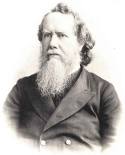I Never Made a Sacrifice : Hudson Taylor, Missionary to China

James and Amelia Taylor loved their children and, like all doting parents, they enjoyed giving them little treats on occasion. But once in a while, when Amelia brought a dessert to the table for her family, James would say, “Who will see if they can do without today?” He explained it to the children this way:
By and by, you will have to say “No” to yourself when we are not there to help you, and very difficult you will find it when you want a thing tremendously. So let us try to practice now, for the sooner you begin, the stronger will be the habit.
The children were not punished if they chose not to give up the sweet, but if they were able to go the entire day without it they were rewarded with some other treat and most importantly, with the loving approval of their parents. Hudson Taylor took this lesson to heart and learned early how to say “no” to himself. He went on to live a life characterized by self-denial for the sake of the gospel, and yet, when he looked back over his long life he said, “I never made a sacrifice.” How could he honestly say such a thing?
From his conversion in his teens, Hudson Taylor had a deep passion for God and desire to serve him as a missionary in China. All through his young adulthood his focus on this goal never failed. Most of China’s inland cities had never seen a foreign missionary and a million Chinese each month were dying without having heard the gospel. Taylor could not understand how any believer could be unmoved in the face of such staggering need. He left his home in Barnsley in 1850 to study medicine in London, planning to go to China at the first opportunity as a medical missionary.
Taylor was touched by the plight of the poor in the slums of London. He chose to live among them in order to devote as much of his small income as possible to medicines and tracts to alleviate both the physical and spiritual suffering of the community. The damp, smelly neighborhood (aptly named Drainside) in which he rented a room was a full four miles from the hospital, which meant Taylor had at least an hour’s brisk walk each way in every kind of weather. He willingly made that sacrifice to serve the poor.
During his studies at the hospital, Taylor was required to dissect a cadaver. While working on a particularly dangerous specimen, a small open wound on Taylor’s finger allowed contaminants from the cadaver to enter his own blood stream. He became ill almost immediately. As soon as the teacher on duty learned what had happened and diagnosed “malignant fever,” he urged Taylor to hurry home to get his affairs in order. “You are a dead man,” he said grimly, expecting Taylor to die within hours. And though Taylor did get very sick, he recovered fully. The physician who cared for him credited Taylor’s careful lifestyle and his long walks to and from the hospital as giving him the stamina to survive. Suddenly, his choice to live in Drainside didn’t seem like a sacrifice.
During this same period of Taylor’s life, the woman he loved refused to marry him unless he gave up his dream of serving in China. Taylor ended this relationship with tears. He trusted that God (like his parents at the dinner table) would have something better for him later if he denied himself for the sake of the gospel. And his faith proved true. God provided a wife in China—one who shared his passion for missionary work. Maria grew up in China, the daughter of English missionaries in Shanghai. She was as fluent in Mandarin as she was in English and became great help and comfort in Taylor’s work. “It never cooled, my love for her,” he said forty years later—”It has not cooled now.” The relationship he gave up in London no longer seemed like a sacrifice.
In China, Taylor found that to gain an audience with the people, he first needed to give up his European dress and customs. He adopted a pigtail and chopsticks and traveled from town to town, living in boats, in small shacks or in attic garrets, usually battling insects and vermin. Once, on a journey to an inland city, he was robbed of his traveling bed, spare clothes, surgical instruments, and a Bible given to him by his mother. Taylor decided not to prosecute the thief because of the harsh Chinese penal system, but wrote the culprit a letter instead, urging him to repent. He described his plea to the errant servant in a letter sent home to England. That letter somehow fell into the hands of George Mueller of Bristol. He was so impressed by the spirit of the writer that he became a supporter of the mission. Taylor’s sacrifice of the right to prosecute the man who stole his bed resulted in a supporter who would provide over $10,000 per year for the mission and would be a friend and advisor in times of trial. Looking back, giving up the right to justice did not seem like a sacrifice.
Taylor endured many hardships including arrests, insults, slander and poverty, but lived his life believing what Christ said in Mark 10:29 and 30—that if we give up anything for the sake of the gospel we will receive blessings one hundred times better in this life, and eternal life in the world to come. With that perspective, he could truly say, “I never made a sacrifice.”
________________________
Quotes included in this article are taken from the books, Hudson Taylor In Early Years and Hudson Taylor and the China Inland Mission by Dr. and Mrs. Howard Taylor, OMF International, 2005

